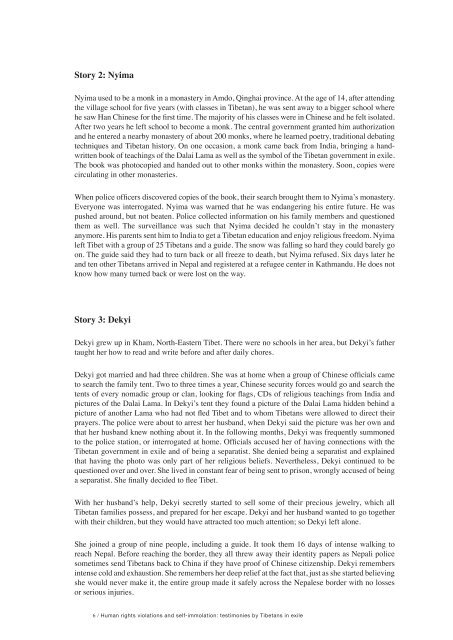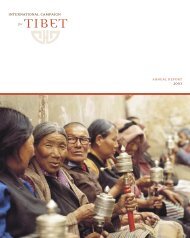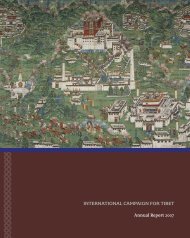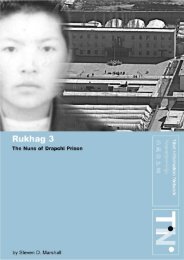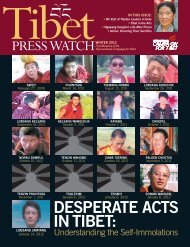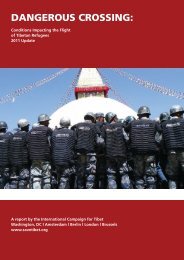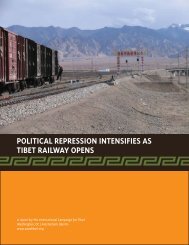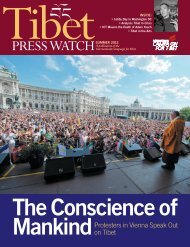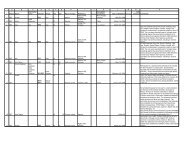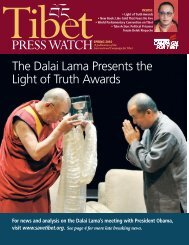to download PDF report. - Tibet Policy
to download PDF report. - Tibet Policy
to download PDF report. - Tibet Policy
Create successful ePaper yourself
Turn your PDF publications into a flip-book with our unique Google optimized e-Paper software.
S<strong>to</strong>ry 2: Nyima<br />
Nyima used <strong>to</strong> be a monk in a monastery in Amdo, Qinghai province. At the age of 14, after attending<br />
the village school for five years (with classes in <strong>Tibet</strong>an), he was sent away <strong>to</strong> a bigger school where<br />
he saw Han Chinese for the first time. The majority of his classes were in Chinese and he felt isolated.<br />
After two years he left school <strong>to</strong> become a monk. The central government granted him authorization<br />
and he entered a nearby monastery of about 200 monks, where he learned poetry, traditional debating<br />
techniques and <strong>Tibet</strong>an his<strong>to</strong>ry. On one occasion, a monk came back from India, bringing a handwritten<br />
book of teachings of the Dalai Lama as well as the symbol of the <strong>Tibet</strong>an government in exile.<br />
The book was pho<strong>to</strong>copied and handed out <strong>to</strong> other monks within the monastery. Soon, copies were<br />
circulating in other monasteries.<br />
When police officers discovered copies of the book, their search brought them <strong>to</strong> Nyima’s monastery.<br />
Everyone was interrogated. Nyima was warned that he was endangering his entire future. He was<br />
pushed around, but not beaten. Police collected information on his family members and questioned<br />
them as well. The surveillance was such that Nyima decided he couldn’t stay in the monastery<br />
anymore. His parents sent him <strong>to</strong> India <strong>to</strong> get a <strong>Tibet</strong>an education and enjoy religious freedom. Nyima<br />
left <strong>Tibet</strong> with a group of 25 <strong>Tibet</strong>ans and a guide. The snow was falling so hard they could barely go<br />
on. The guide said they had <strong>to</strong> turn back or all freeze <strong>to</strong> death, but Nyima refused. Six days later he<br />
and ten other <strong>Tibet</strong>ans arrived in Nepal and registered at a refugee center in Kathmandu. He does not<br />
know how many turned back or were lost on the way.<br />
S<strong>to</strong>ry 3: Dekyi<br />
Dekyi grew up in Kham, North-Eastern <strong>Tibet</strong>. There were no schools in her area, but Dekyi’s father<br />
taught her how <strong>to</strong> read and write before and after daily chores.<br />
Dekyi got married and had three children. She was at home when a group of Chinese officials came<br />
<strong>to</strong> search the family tent. Two <strong>to</strong> three times a year, Chinese security forces would go and search the<br />
tents of every nomadic group or clan, looking for flags, CDs of religious teachings from India and<br />
pictures of the Dalai Lama. In Dekyi’s tent they found a picture of the Dalai Lama hidden behind a<br />
picture of another Lama who had not fled <strong>Tibet</strong> and <strong>to</strong> whom <strong>Tibet</strong>ans were allowed <strong>to</strong> direct their<br />
prayers. The police were about <strong>to</strong> arrest her husband, when Dekyi said the picture was her own and<br />
that her husband knew nothing about it. In the following months, Dekyi was frequently summoned<br />
<strong>to</strong> the police station, or interrogated at home. Officials accused her of having connections with the<br />
<strong>Tibet</strong>an government in exile and of being a separatist. She denied being a separatist and explained<br />
that having the pho<strong>to</strong> was only part of her religious beliefs. Nevertheless, Dekyi continued <strong>to</strong> be<br />
questioned over and over. She lived in constant fear of being sent <strong>to</strong> prison, wrongly accused of being<br />
a separatist. She finally decided <strong>to</strong> flee <strong>Tibet</strong>.<br />
With her husband’s help, Dekyi secretly started <strong>to</strong> sell some of their precious jewelry, which all<br />
<strong>Tibet</strong>an families possess, and prepared for her escape. Dekyi and her husband wanted <strong>to</strong> go <strong>to</strong>gether<br />
with their children, but they would have attracted <strong>to</strong>o much attention; so Dekyi left alone.<br />
She joined a group of nine people, including a guide. It <strong>to</strong>ok them 16 days of intense walking <strong>to</strong><br />
reach Nepal. Before reaching the border, they all threw away their identity papers as Nepali police<br />
sometimes send <strong>Tibet</strong>ans back <strong>to</strong> China if they have proof of Chinese citizenship. Dekyi remembers<br />
intense cold and exhaustion. She remembers her deep relief at the fact that, just as she started believing<br />
she would never make it, the entire group made it safely across the Nepalese border with no losses<br />
or serious injuries.<br />
6 / Human rights violations and self-immolation: testimonies by <strong>Tibet</strong>ans in exile


